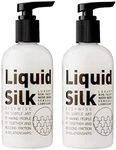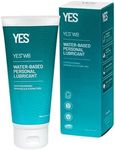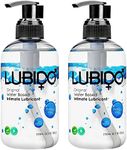Buying Guide for the Best Lube For Menopause
Choosing the right lubricant for menopause can significantly improve comfort and intimacy. Menopause often leads to vaginal dryness due to hormonal changes, making lubrication essential for reducing discomfort during sexual activity and daily life. When selecting a lubricant, it's important to consider various factors to ensure it meets your specific needs and preferences. Here are some key specifications to help you make an informed decision.Base TypeLubricants come in different base types: water-based, silicone-based, and oil-based. Water-based lubricants are versatile, easy to clean, and safe to use with condoms and sex toys. Silicone-based lubricants last longer and provide a silky feel, but they can be harder to wash off and may not be compatible with silicone toys. Oil-based lubricants offer a natural feel and are long-lasting, but they can degrade latex condoms and may cause infections if not properly cleaned. Choose a base type that aligns with your usage preferences and any sensitivities you may have.
IngredientsThe ingredients in a lubricant are crucial, especially if you have sensitive skin or allergies. Look for products that are free from glycerin, parabens, and fragrances, as these can cause irritation or infections. Natural and hypoallergenic ingredients are often gentler on the skin. If you have specific allergies, always check the ingredient list to avoid any adverse reactions.
pH BalanceMaintaining the natural pH balance of the vagina is important to prevent infections and irritation. A lubricant with a pH level that matches the natural vaginal environment (typically between 3.8 and 4.5) is ideal. This helps maintain a healthy vaginal flora and reduces the risk of bacterial or yeast infections. Check the product label for pH information to ensure it is suitable for vaginal use.
ConsistencyLubricants come in various consistencies, from thin and runny to thick and gel-like. Thinner lubricants are easier to spread and may feel more natural, but they might need to be reapplied more frequently. Thicker lubricants provide longer-lasting moisture and are less likely to drip, making them ideal for extended activities. Consider your personal preference and the type of activity you plan to use the lubricant for when choosing the consistency.
LongevityThe longevity of a lubricant refers to how long it remains effective before needing reapplication. Silicone-based lubricants generally last the longest, followed by oil-based, and then water-based lubricants. If you prefer not to interrupt your activities to reapply, a longer-lasting lubricant might be more suitable. However, if you prioritize ease of cleaning, a water-based lubricant might be the better choice despite needing more frequent application.
CompatibilityConsider the compatibility of the lubricant with condoms and sex toys. Water-based lubricants are safe to use with all types of condoms and toys. Silicone-based lubricants should not be used with silicone toys as they can degrade the material. Oil-based lubricants can damage latex condoms, so they are best used with polyurethane condoms or without condoms. Ensure the lubricant you choose is compatible with your preferred contraceptive methods and toys.














